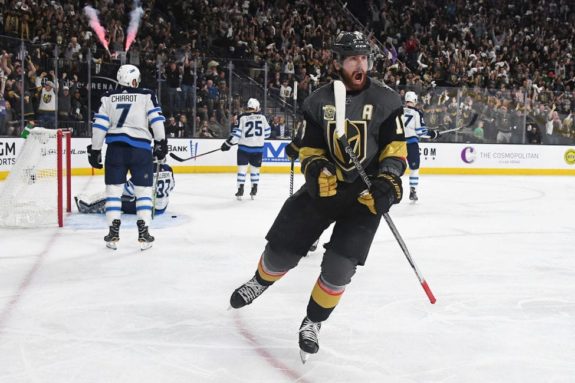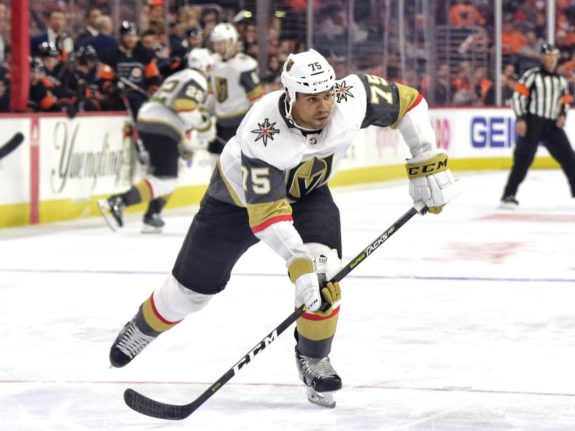The Seattle Kraken will have higher on-ice expectations heading into their first season than most expansion teams. They enter the NHL just four years after the Vegas Golden Knights won the Pacific Division and advanced to the 2018 Stanley Cup Final. Here are five success factors from the Golden Knights’ first season that the Kraken can emulate in 2021-22.
Don’t Name a Captain
The Golden Knights succeeded immensely from the onset by holding players as equally accountable as a team can. They broke the mold of naming one captain and two-to-three alternate captains. Instead, they designated six veterans as alternate captains, with James Neal as the only player with prior role experience.
The decision to value formalized leadership less than other clubs produced one of the strongest team mindsets in the NHL. It materialized excellent chemistry between forward lines and defensive pairings as players grew outside of their traditional roles to better complement each other.

William Karlsson not only surged for an unprecedented 43 goals but also earned 78 takeaways as the Golden Knights finished second in the NHL in that category. Blueliner Colin Miller contributed 17 power-play points, including five goals, versus his lone tally in 103 games with the Boston Bruins. Depth defenseman Brad Hunt registered 18 points in 45 games, despite averaging just 16:39 of time on ice.
Previous expansion clubs, including the Columbus Blue Jackets, Minnesota Wild, Atlanta Thrashers (Winnipeg Jets), and Nashville Predators designated a captain in their first season, but they didn’t make the playoffs until at least their third season.
Balance Ice Time & Offensive Opportunities
Head coach Gerard Gallant deployed his roster as evenly as any NHL coach, giving each player ample ice time and chances on offense. Among defensemen, Nate Schmidt averaged the most time on ice at 22:14, but Miller, who averaged the fifth-most, still put in a healthy 19:21. Depth forwards such as Pierre-Édouard Bellemare, Brendan Leipsic, Oscar Lindberg, and Tomáš Nosek logged respectable ice time for their roles — around 11 to 12 minutes per game.
Even a defensive specialist like Bellemare, who led the team in defensive zone starting percentage (dZS%) at 54.0 — among Golden Knights with at least 31 games played — was given opportunities to shine. Despite averaging just 9:57 of even-strength time on ice, he still contributed six goals and 10 assists with a respectable 52.1 Corsi for percentage (CF%). Conversely, Karlsson, who led the team in scoring, split his zone time fairly evenly (51.6 oZS% to 48.4 dZS%), contributing 45 blocked shots and logging 1:39 shorthanded — tied for second among forwards.
Gallant’s roster management yielded excellent results throughout the lineup. Nine players scored at least 10 goals, and 10 players averaged well over 30 points per 82 games played. Even players not in that group produced above expectations. Ryan Carpenter scored nine goals in 36 games, depth center Lindberg added nine goals despite averaging 11:47 time on ice, and 35-year-old Deryk Engelland scored a career-best 23 points.
Be Aggressive Between the Expansion Draft & Trade Deadline
General manager George McPhee engineered a series of deals following the 2017 NHL Expansion Draft that helped Vegas be buyers at the 2018 Trade Deadline. Ten days following the draft, he cleared $10.825 million in salary cap by trading defensemen Trevor van Riemsdyk, David Schlemko, Marc Methot, and Alexei Emelin. He followed up those moves by clearing an additional $1 million on opening day, moving goaltender Calvin Pickard to the Toronto Maple Leafs.

With the Golden Knights firmly atop the Pacific Division before the trade deadline, McPhee had a sizable cushion to add key pieces for a Stanley Cup push. In a three-way deal with the Pittsburgh Penguins and Ottawa Senators, he took on $2 million of Derick Brassard’s contract, helping the club net enforcer Ryan Reaves and his $1.125 million salary. He then traded for perennial 20-goal scorer Tomáš Tatar ($4.8 million). Tatar didn’t pan out in Sin City, and the Golden Knights forfeited some draft picks, but nonetheless, Vegas gained cap space for the following season and retained Reaves as part of the team core.
Stress Success Against the Pacific Division
Vegas was lights-out against Pacific Division opponents in 2017-18, posting a 20-6-3 record. That’s 1.48 points per game, averaging out to 122 points over an 82-game season. The Golden Knights posted an above-.500 record against six of the seven teams, with the Edmonton Oilers being the exception (Vegas was 1-2-1).
Assuming the Kraken assemble a competitive NHL roster, they could have as good a chance as most Pacific Division teams at making the playoffs. Currently, the Oilers and Golden Knights are the steadiest franchises in the division. The Calgary Flames & Vancouver Canucks have regressed significantly, the San Jose Sharks are spiraling downward, and the Los Angeles Kings & Anaheim Ducks may still need time for their young talent to flourish. The Arizona Coyotes move to the Central Division next season.
A roster similar to the 2017-18 Golden Knights could compete with most Pacific Division teams. That said, the NHL has yet to finalize the number of divisional games for the 2021-22 season.
The Players Should Build Close Community Ties
Nine days before the Golden Knights’ highly anticipated home opener, the Vegas community suffered one of the most tragic recent events in American history, when a shooter took 58 innocent lives on Oct. 1, 2017.
The Golden Knights players, not just the front office, took immediate action in helping the community heal. Three days following the shooting, about 15 players visited the Las Vegas Metropolitan Police Department and the local United Blood Services center. At their home opener, the organization honored the victims and first responders, and from that point on, it became associated with much more than just a sport.
The Golden Knights’ close ties to their community fueled the on-ice product, as Vegas went 29-10-2 at home their first season. They also won six of their first seven home playoff games before meeting the Washington Capitals in the final.
It is improbable that the Kraken can create that level of community impact right away, but they need to start once they have drafted a roster. Their efforts may not translate into wins in their first season, but they will at least add another reason to retain fans after the new team luster wears off.
Additionally, whereas the Golden Knights were Las Vegas’ first professional sports franchise, the Kraken enter their market with immediate, intense competition to which they should assimilate. Seattlites have formed some of sports’ most passionate fan bases, producing intimidating home atmospheres that the Kraken will want to replicate. Assuming the 2021-22 NHL season starts in October, the Seahawks’ regular season will be several weeks underway, and the Sounders, who draw over 40,000 fans per game, will be nearing the MLS playoffs. University of Washington football, also in Seattle, drew over 65,000 fans per game in 2019, too.
Final Thoughts
The Kraken may not finish with 109 points, win their division, or make it to the Final in their first season, but they will likely succeed on the ice quicker than most expansion clubs. They can work off the Golden Knights’ blueprint and further tailor it to their roster, coaching staff, and team management. They will also benefit from the same expansion draft rules as Vegas. With this in mind, they should finish their first season much more strongly than the four expansion teams that preceded the Golden Knights; the Blue Jackets, Wild, Thrashers, and Predators collectively averaged just over 60 points their first year.